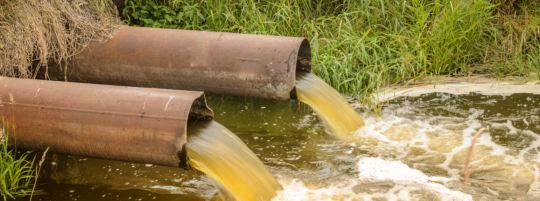Polluted waterways: the Environmental Law Foundation joins others giving evidence to the Court of Appeal
Claire Fowler reports that the Environmental Law Foundation (ELF), one of this site’s organisations designated as ‘working for the common good, on a shoestring’ has intervened to present evidence to the Gourt of Appeal, together with the Good Law Project, London Waterkeeper, Stonyhurst College and Kent Environment and Community Network
The water industry is now facing its biggest wave of protests since it was privatised more than 30 years ago, as campaigners from the Windrush Against Sewage group in Oxfordshire to Ilkley Clean River in Yorkshire, try to force action from companies and policymakers.
 Emma Montlake, ELF’s joint executive director (left), said: “ELF works with and assists communities across the country plagued by the environmental and health consequences associated with sewage pollution into British water systems. We are delighted that the Court of Appeal has agreed that ELF’s evidence and that of others in the consortium will be able to assist the Court of Appeal to understand the context and wider ramifications of unchecked sewage pollution.”
Emma Montlake, ELF’s joint executive director (left), said: “ELF works with and assists communities across the country plagued by the environmental and health consequences associated with sewage pollution into British water systems. We are delighted that the Court of Appeal has agreed that ELF’s evidence and that of others in the consortium will be able to assist the Court of Appeal to understand the context and wider ramifications of unchecked sewage pollution.”
In December, the Financial Times reported that publicly owned water firms, which were sold off with no debt and handed £1.5bn when they were privatised 30 years ago, have since borrowed £53bn, the equivalent of around £2,000 per household.
Much of that has been used to pay £72bn in dividends to their big shareholders rather than invest in infrastructure – cutting costs by frequently illegally discharging sewage into rivers and the sea.
Elf and the other four organisations will present evidence to support a case aiming to protect the rights of communities to challenge water companies for dumping raw (untreated) sewage into rivers and seas.
This particular case concerns discharges from combined sewage outfalls into the Manchester Ship Canal. There is increasing evidence that such discharges are happening frequently into watercourses around the UK, not just – as permitted – in exceptional circumstances.
 The Guardian reports that the Good Law Project (GLP) and the Environmental Law Foundation (ELF) are challenging a decision by the high court that the water company United Utilities cannot be subject to any private legal action for its discharges of raw sewage from storm outfalls into the Manchester ship canal.
The Guardian reports that the Good Law Project (GLP) and the Environmental Law Foundation (ELF) are challenging a decision by the high court that the water company United Utilities cannot be subject to any private legal action for its discharges of raw sewage from storm outfalls into the Manchester ship canal.
The Good Law Project adds that sewage was dumped into English rivers on more than 400,000 separate occasions in 2020 for a total of over three million hours. United Utilities was responsible for over a quarter of these. The company’s sewage dumping affects rivers across Greater Manchester, Cumbria, Merseyside, Cheshire and Lancashire, as well as in Derbyshire.
In their recent report, the Environmental Audit Committee agreed, saying that water companies “appear to be dumping untreated or partially treated sewage in rivers on a regular basis.”
 Evidence of harm include testimony from river swimmer Susan Mote, who told BBC South East that her dips in the River Ouse had left her with repeated ear infections, possibly caused by the polluted water. She was one of 12 people who reported falling sick after swimming or paddling in rivers and seas and suspected sewage pollution was responsible for their illness.
Evidence of harm include testimony from river swimmer Susan Mote, who told BBC South East that her dips in the River Ouse had left her with repeated ear infections, possibly caused by the polluted water. She was one of 12 people who reported falling sick after swimming or paddling in rivers and seas and suspected sewage pollution was responsible for their illness.
According to Surfers Against Sewage, in the UK last year “six out of eight rivers tested pose a continuous serious risk to human health.” And it is now well known that only 14% of English rivers are classified as being in good health.
Groups ranging from British Canoeing to River Action UK have all called on water companies to live up to their responsibilities and do much more to protect the UK’s rivers.
If the appeal is rejected, water companies will have been granted ‘near-immunity’ to discharge sewage in Britain’s rivers and seas.
o
Posted on February 6, 2022, in Environment, Environmental Law Foundation Ltd and tagged Emma Montlake, Environmental Audit Committee, Manchester Ship Canal, Surfers Against Sewage, The Good Law Project, water companies. Bookmark the permalink. Leave a comment.


Leave a comment
Comments 0